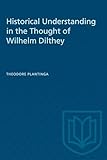Historical Understanding in the Thought of Wilhelm Dilthey / Theodore Plantinga.
Material type: TextSeries: HeritagePublisher: Toronto : University of Toronto Press, [1980]Copyright date: ©1980Description: 1 online resource (216 p.)Content type:
TextSeries: HeritagePublisher: Toronto : University of Toronto Press, [1980]Copyright date: ©1980Description: 1 online resource (216 p.)Content type: - 9781487580889
- 9781487579814
- 193 22
- B3216.D84 P55eb
- online - DeGruyter
| Item type | Current library | Call number | URL | Status | Notes | Barcode | |
|---|---|---|---|---|---|---|---|
 eBook
eBook
|
Biblioteca "Angelicum" Pont. Univ. S.Tommaso d'Aquino Nuvola online | online - DeGruyter (Browse shelf(Opens below)) | Online access | Not for loan (Accesso limitato) | Accesso per gli utenti autorizzati / Access for authorized users | (dgr)9781487579814 |
Browsing Biblioteca "Angelicum" Pont. Univ. S.Tommaso d'Aquino shelves, Shelving location: Nuvola online Close shelf browser (Hides shelf browser)

|

|

|

|

|

|

|
||
| online - DeGruyter Quebec 70 : A Documentary Narrative / | online - DeGruyter Pythagoras and Early Pythagoreanism / | online - DeGruyter Orpheus : The Metamorphoses of a Myth / | online - DeGruyter Historical Understanding in the Thought of Wilhelm Dilthey / | online - DeGruyter The Rancheros of Pisaflores : The History of a Peasant Bourgeoisie in Twentieth-Century Mexico / | online - DeGruyter Religion and the University / | online - DeGruyter Karlstadt as the Father of the Baptist Movements : The Emergence of Lay Protestantism / |
restricted access online access with authorization star
http://purl.org/coar/access_right/c_16ec
Wilhelm Dilthey (1833-1911), a philosopher who has influenced twentieth-century intellectual history via such thinkers as Heidegger, Jaspers, Ortega y Gasset, and Max Scheler, is subjected to careful analysis in this book. What emerges is a reinterpretation of his theory of understanding (Verstehen) and historical knowledge. The concept of understanding for which Dilthey became famous was developed only after 1900, in the third and final phase of his career, but it was an approach to the problem or set of problems that had preoccupied him throughout his entire intellectual career. To delineate this doctrine and its place in Dilthey's thinking on history, the author discusses Dilthey's early views on history as a science, his efforts to divide the various sciences into two major types, and his attempt to develop a psychology that would serve as a foundation for the Geisteswissenschaften. The decisive shift in Dilthey's post-1900 thought came when he began to look beyond psychology to culture, to meaning-lade expressions of the human spirit. The understanding of these expressions in the other public world, he decided, was the basic cognitive operation on which the Geisteswissenschaften, including the historical sciences, could be built. Dilthey's analysis of understanding, the core of his later philosophy, draws on this hermeneutic tradition and advances it. His philosophical outlook also has important existential applications that have stimulated twentieth-century has important existential applications that have stimulated twentieth-century thought. The central problem for him was that of the relation between the individual and the whole of wholes with which his life is interwoven, and his solution was 'understanding,' an ability which enables the individual to transcend the confines of self and to seek communion with a more encompassing whole.
Mode of access: Internet via World Wide Web.
In English.
Description based on online resource; title from PDF title page (publisher's Web site, viewed 01. Nov 2023)


